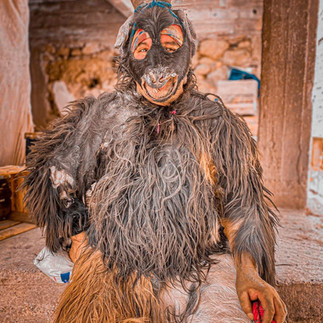Eid Al-Adha in Morocco: Traditions, Celebrations, and What to Expect in 2024
- Hassan Elkadi
- May 4, 2024
- 4 min read
Eid Al Adha in Morocco: Traditions, Celebrations, and What to Expect
Eid Al Adha, also known as the "Festival of Sacrifice," is one of the most significant Islamic holidays celebrated globally. Morocco's occasion is marked with distinctive customs and traditions, making it a unique cultural event. Here's how Moroccans prepare for and celebrate this memorable holiday.
Preparations and Customary Practices of Eid Al Adha
Preparations for Eid Al Adha start at least a week before the actual holiday. Moroccan families thoroughly clean their homes, stock up on fresh spices, fruits, and vegetables, and purchase new clothes. As many markets and stores close during the holiday, stocking up in advance ensures smooth celebrations.
A crucial part of the preparation involves acquiring a sheep or goat for the traditional sacrifice. This is where most of the budget for Eid Al Adha is allocated. The animal is carefully selected, kept in the family's courtyard or balcony, and looked after until the big day.
Eid Al Adha: The Big Day
A palpable sense of anticipation fills the air on the day of Eid Al Adha. The morning commences with the Takbir, a ritual proclaiming God's greatness. Clad in traditional Moroccan attire like the djellaba, families flock to mosques or open spaces for special Eid prayers. Led by an imam, these prayers involve specific recitations and prostrations. After the prayers, people exchange warm greetings of "Eid Mubarak," meaning "Blessed Eid," before heading home for a joyous celebratory breakfast.

Bilmawen Festival in the High Atlas Mountains
Bilmawen, also known as Boujloud (in Arabic: بوجلود), is a traditional Berber festival celebrated annually during Tafaska (Eid Al Adha) in the Souss region and the western High Atlas Mountains. The festival, which has a long history dating back to ancient times, was initially a spiritual ritual. However, it has transformed into a festive event centred on costumes and masks over the years. The festival's name, Bilmawen Budmawen, has roots in the Berber language: "Bilmawen" translates to "possessor of skins." At the same time, "Budmawen" means "possessor of faces." The event is a unique spectacle that provides a fascinating glimpse into Morocco's rich cultural heritage and the distinct traditions of the High Atlas Mountains.
Festive Breakfast (Ftour)
Breakfast, known as 'Ftour,' is an essential and delightful part of Eid Al Adha celebrations. It is a time for families to come together and share a meal, symbolizing unity and togetherness. Families prepare traditional Moroccan pastries like sweet fekkas with almonds, beghrir (Moroccan crêpes), and msemmen (flaky Moroccan pancakes). These treats are accompanied by fresh bread and Moroccan mint tea. A highlight of the sweets is kaab el ghazal ("gazelle horns"), a crescent-shaped cookie filled with almond paste and dusted with powdered sugar.
The Sacrifice Ritual
Following the breakfast, families come together to perform the sacrificial ritual, a cornerstone of Eid Al Adha, in adherence to Islamic customs. The animal is humanely slaughtered while a prayer is recited and then divided into three portions: one for the family, one for friends and neighbours, and one for the less fortunate. Some families even donate the entire animal, embodying the generosity and community that defines this joyous occasion.
In Moroccan households, women traditionally play a central role in preparing and cooking the sacrificial animal. They clean and prepare the animal, ensuring that every part is used. They then cook unique dishes using different parts of the sheep, employing blends of spices. These delicacies, typically prepared only once or twice a year, coincide with this holiday and are a testament to Moroccan women's culinary skills and creativity.
Mouthwatering Moroccan Dishes for Eid Al Adha
Moroccans celebrate Eid Al Adha with elaborate and flavorful meals, each with its own unique history and significance. Key dishes include:
Boulfaf: Skewered, grilled lamb liver and heart wrapped in caul fat, seasoned with salt and cumin, and served with homemade bread and mint tea.
Tkelia: A slow-cooked stew made from the stomach and meat seasoned with garlic and tomatoes.
Spiced Brain: Cooked in a tomato sauce with garlic and eggs.
Grilled Shoulder Meat: Marinated in chermoula, a blend of cumin, onions, paprika, salt, and pepper.
Mrouzia: A lamb tagine sweetened with raisins, fried almonds, and honey.
Mechoui: Slow-roasted lamb served with bread, tea, salad, and zaalouk (roasted eggplants in tomato sauce).
Benefits and Challenges of Visiting Morocco During Eid Al Adha
Pros:
A unique cultural insight into Moroccan traditions: The opportunity to partake in the feast with a local family can be a truly unforgettable experience, providing a deeper understanding of the profound meaning of family and faith in Morocco during this time.
Quiet Escapes: With many Moroccans spending time with their families, this is an ideal opportunity to explore uncrowded beaches, national parks, and reserves.
Cons:
Crowded Transportation: Expect packed buses and trains as many people travel to reunite with families.
Closed Establishments: Many stores close, especially on the first day. Plan your meals ahead and book a dinner at your riad or hotel.
Heat Preparedness: Given the soaring summer temperatures, bring water and sun protection when outdoors.
Despite the challenges, Eid Al Adha is a joyous occasion full of generosity and communal spirit. It's a must-see experience for travelers who want to witness the profound meaning of family and faith in Morocco during this time.
Plan your trip and explore the true spirit of Eid Al Adha in Morocco!
For more tailored experiences and guided tours highlighting Morocco's rich traditions and environmental heritage, consider contacting Nomadik Morocco. Our team is dedicated to crafting unforgettable journeys that showcase the best of Morocco.
Do you have any questions or want to share your experiences? Comment below!
Sign up here to stay updated with our latest articles and receive exclusive insights into Moroccan culture.
Happy Exploring!

.png)












Comentários